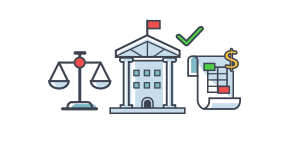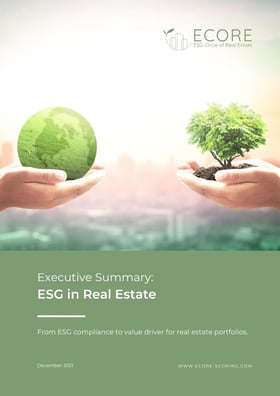
ESG:
Social Good for the Real Estate Industry
TABLE OF CONTENTS
ESG: Environmental, Social and Governance
ESG, short for Environmental, Social and Governance, represents a fresh approach for corporations to delve into and evaluate their ethical perspectives. Emphasizing a diverse array of factors that promote societal welfare, ESG principles encompass social ethics, environmental preservation, and sustainable business strategies.
Discover more about various ESG topics through the expert articles on our ESG blog.



ESG: A High-Value Strategy
ESG should be an important part of any corporate or portfolio manager’s business strategy. Research has shown that intangible assets can add serious value to a company, appealing to investors and improving their social standing. For example, companies that have a strong ESG strategy are generally more attractive to investors. In short: ESG not only improves society but will also add value to your portfolio.
In 2019, more than $176 billion was invested in socially responsible and ESG-compliant companies. That is a 525% rise in investment since 2015. By 2025, it’s expected that investment into ESG-compliant assets could hit $53 trillion by 2025 if the current trends continue.
ESG is a high-value strategy, but what does it mean?
EXECUTIVE SUMMARY:
ESG IN REAL ESTATE
DOWNLOAD WHAT YOU NEED TO KNOW
What is ESG?
While the acronym stands for Environmental, Social and Governance, defining ESG isn’t as easy as you would think, and what ESG means as a whole is more than just a collection of progressive principles. Before we take a closer look into the separate ESG pillars, here is a quick summary of what ESG means.
ESG is more than just a series of rules. Instead, it’s about sustainable practices and approaches that add financial and moral value to corporations and portfolios.
Company’s that adhere to these principles by matching their words with positive actions become more attractive to shareholders, customers, government organizations, and the general public. In today’s competitive business market, it’s essential to focus on ESG principles and how they can help you strengthen your reputation and generate profits at the same time.
To get a better idea of how Environmental, Social and Governance strategies can help your business, let’s take a look at what each pillar means.
The 3 Pillars of the ESG Concept

Companies should endeavour to use sustainable practices that prevent damaging the environment. These can include immediately obvious actions such as preventing deforestation or harming biodiversity, but it can also micro-actions such as a positive recycling policy, energy conservation, and considering the life cycle of certain tools and products.
The environmental aspect of ESG can readily be measured against universal criteria, using CO2 emissions standards, sourcing sustainable energy, and complying with local and international environmental guidelines.

From a business perspective, Social can focus on whether an employer benefits its employees or sources materials from local suppliers.
However, from a real-estate perspective, the goalposts are different. For example, a healthy and positive tenant relationship is an essential social element for real-estate managers, or acting on tenant feedback and improving tenant satisfaction.

A strong interest in the Governance part of ESG has an over-arching influence on the other two portions. For example, ESG-focused Governance should focus on how a company deals with a sustainability strategy and complies with local regulations, by assessing the measures being taken and whether promises that have been made are being kept.
In short, “Governance” is all about how a company conducts its business in terms of sustainable and responsible practices.
What does ESG mean for companies?
ESG principles should be at the heart of any company’s growth strategy. Not only does ESG compliment many of the United Nation’s Sustainability Goals, but it also helps add value to a company and generate profit in many cases. As mentioned in the summaries above, ESG is directly linked to how a company conducts business and having an attractive ESG strategy appeals to a broader range of stakeholders.
A strong ESG plan, supported by positive actions, proves that a company is willing to work in a transparent, environmentally-friendly, sustainable, and socially responsible way. This kind of reputation can pay dividends in many ways.
- Forward-thinking companies that adhere to ESG principles can attract superior business partners, or help land lucrative government contracts, often leading to meaningful partnerships and better government/business relations in the future.
- ESG strategies can also drastically lower operating costs, reducing energy consumption or water usage. While these can help save money in the short term by reducing operating costs, by optimizing assets with ESG in mind, it’s possible to cut costs, enhance investment returns, and protect the environment too.
- Working with ESG can also create unique business opportunities. By following a strategic ESG plan, it’s possible to either earn government support in the form of subsidies or be allowed to work outside of regulations because of a reputation for excellence.
- Lastly, a company that works with a focus on environmental, social, and governance ideals will be more appealing to its employees, boosting morale, increasing productivity, and attracting top-level talent.
ESG is vital for investors, important to the community, and the key to optimizing assets and adding value.
ESG Criteria: Pros and Cons
The pros of having an ESG strategy are numerous. Aside from the obvious ethical and financial concerns, there are many other good reasons to put ESG at the front and centre of any future growth strategy. Focusing on environmental concerns, championing human rights, and doing social good can help keep companies on a steady path to growth by steering them away from risk factors that could lead to short-term gains, but jeopardize the future of a business. Risky business practices can generate revenue, but as sustainability-conscious trends begin to rise and businesses are required to provide more transparency, ESG-aligned companies are sure to be the long-term winners.
However, it’s not all good news. If executed incorrectly, an ESG strategy can backfire. Terms like “greenwashing” are becoming everyday terms. Greenwashing is the act of deliberately misleading consumers and audiences by claiming that a practice, product, or business, is environmentally friendly or sustainable when it isn’t.
By falsifying claims, a company can look appealing on paper, when in reality it couldn’t be further from the truth. This kind of practice erodes trust and can undermine the ESG strategies of others, and even cast doubt upon the validity of vastly important organizations and their work, such as the United Nation’s Sustainability Goals among others.
Frequently Asked Questions about ESG
Despite being hugely important, there is no universal standard for measuring ESG compliance. However, there are many trustworthy ways that a company may assess its ESG scores. ESG scores come in a variety of forms, from ESG ratings to ESG benchmarking, with many different research houses (such as Bloomberg, Refinitiv, and Savills) offering in-depth reports based on the results of in-depth surveys, assessments, and site visits. Some scores can even be self-assessed using benchmarking survey tools.
In general, these results are scored using a star system: the more stars that a company has, the more ESG-compliant it is. However, different companies pay attention to different metrics, and it’s very important to remember that there is currently no universal taxonomy for assessing ESG compliance.
Although there are no uniform standards, it doesn’t mean that ESG scores hold no value. Experts in the field have compared ESG scoring to blockchain: it’s vastly important but with no global standard as of yet. However, many research houses and assessment tools rely on a similar methodology, often based around an in-depth questionnaire, which is often based on other standards from similar industries. For example, some ratings are calculated using EU regulations, or the World Building Standards surveys, or the Wired Score, as frameworks to build a score. As the interest in ESG rises, global standards will become established in the future.
SRI, or Socially Responsible Investing, is often compared with ESG. The two are very similar but some notable differences are worth keeping in mind before you begin your ESG journey. Unlike ESG, SRI actively discounts or promotes investments based on ethical guidelines. ESG, however, measures a company’s environmental, social, and governance practices, with other financial measures, and rates them rather than removing them as options.
ESG ratings and ESG benchmarking are not the same things. In short, ESG certification, or ESG ratings are more in-depth assessments. They feature in-depth analysis that can help portfolio managers and business managers develop and deploy an incredibly informed ESG strategy. They are sophisticated analyses that require a lot of research, detailed questionnaires, in-person site visits, and labour-intensive inquiries. For those looking for a roadmap towards indisputable ESG compliance, an in-depth assessment can be an expensive investment that will yield positive results.
However, it’s not always in the best interest of a company to go down this route, and that’s where benchmarking comes into play.
ESG benchmarking is a simpler form of assessment that’s targeted to a different audience and serves a different purpose. In short, ESG benchmarking provides broader results that can give portfolio managers, business owners, and investors, a broader indicator of what an asset is worth. The benefit of this, of course, is that although it’s broader, it can provide ESG clarity to a bank, valuer, or fellow managers. It is not as in-depth and often does not require a site visit, but it provides a different result.
In summary, ESG ratings from research houses and advisory companies, such as Savilles, can provide an impressive deep-dive into ESG compliance and provide a detailed strategy for the future. ESG benchmarking services, such as those provided by companies such as ECORE, can provide a helpful initial indication that can be used to attract investors or secure funding.
ESG investing is a very popular term, but what does it mean? So far, we’ve covered the salient points about ESG, but the actual investment topic is worthy of a separate article.
In short, ESG investing is very similar to socially responsible investing, sustainable investing, and impact investing. It applies to investors who see the value in prioritizing ESG ethics and companies and portfolios that are dedicated to reaching ESG-driven outcomes. ESG investing is all about investing in projects that have positive environmental, social, and governance, end goals based on the assumption that environmental and social factors can have a measurable influence on the financial performance of organizations and portfolios.
Investing in support of social good has grown in popularity in recent years. However, the effects and influence of the COVID-19 pandemic have seen interest in ESG investments grow significantly. Since ESG outcomes are built around resiliency, it’s not hard to see why investors are keen to put their money in sustainable businesses and portfolios.
At bee smart city, we’re in the business of supporting and promoting Smart Cities, but what does that have to do with ESG? So far, it would seem like ESG is a measurement tool for investors to use to gauge the potential future profitability of a portfolio or business, and while that’s true, there’s more to ESG than making money.
ESG goals are all about sustainability, whether that’s in the form of building practices, climate protection, social justice, social responsibility, or democratic governance. All of these positive ethics run in parallel with the United Nations Sustainable Development Goals, which are key pillars of modern Smart City development. That sounds like big talk, but the link from ESG to Smart City is quite simple.
Smart Cities are formed by smart buildings, populated and governed by smart citizens, living in smart districts, who work in smart businesses. It’s smart workplaces and buildings that are the foundations of our smart cities, and with more businesses and real-estate developers supporting ESG principles and working towards ESG compliance, we can accelerate the Smart City ecosystem and integrate ESG strategies into the future of our municipalities.
Step into your ESG Journey

If measured correctly, ESG can be a wonderful way to add value to your company. A deliverable strategy that prioritises ESG principles can bolster your reputation, attract new and fresh investors, and give your brand far-reaching appeal, helping you score lucrative new contracts and expand your business. However, ESG needs to be more than just a slogan or company mission statement. It needs to be supported with positive actions.
Like all good stories, your ESG journey should start at the beginning: with a broad assessment of your company or portfolio’s ESG prospects as a status quo. To do this, we recommend investigating ESG benchmarking tools such as ECORE. With ECORE, it’s possible to get a strong overview of your ESG situation without having to invest much in the way of money or time. Armed with a benchmarking score, it’s then possible to set new ESG goals by refining certain areas that you’re struggling with before investing in a more in-depth ESG assessment and strategy deployment.
ESG doesn’t have to be an essential part of your business strategy, but it should be. Positive actions, social good, climate protection, reducing carbon emissions, bringing social equity to the workplace, providing transparent and fair governance, and much, much more, are key features of the business landscape of the future, and an accelerator of smart development. ESG is a pathway to a brighter future, but to get there, we need to take the first step.
EXECUTIVE SUMMARY:
ESG IN REAL ESTATE
DOWNLOAD: WHAT YOU NEED TO KNOW ABOUT ESG



